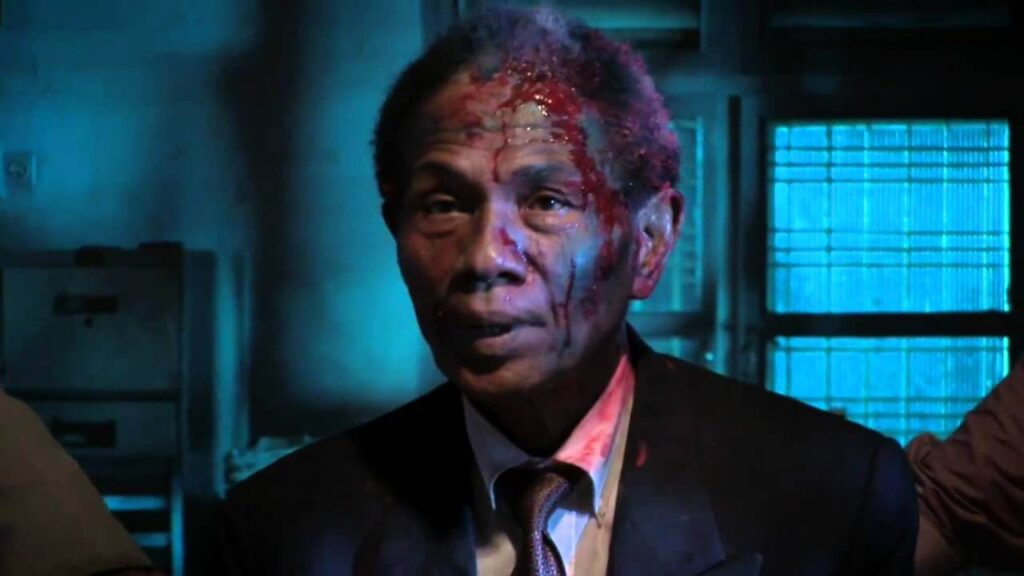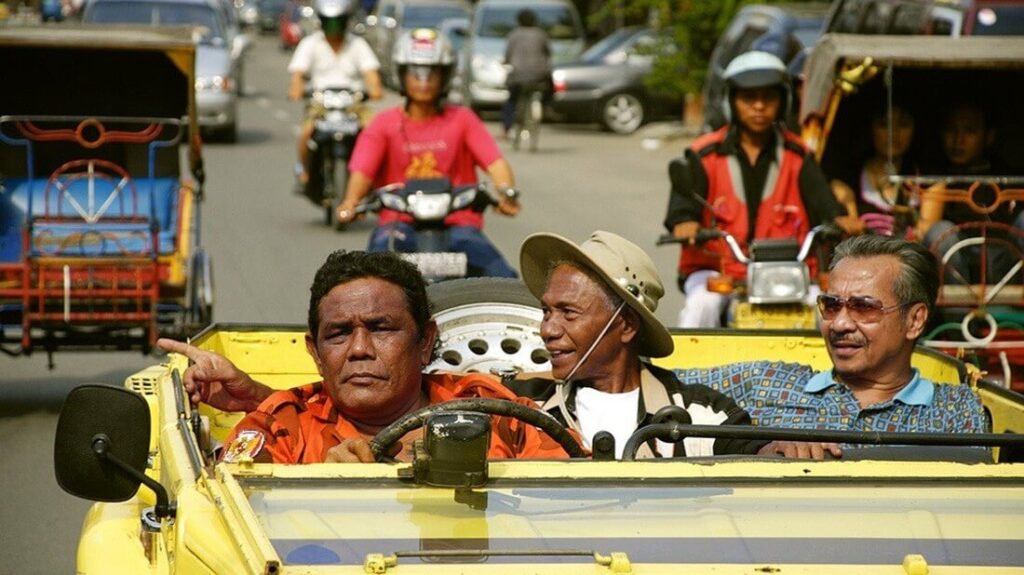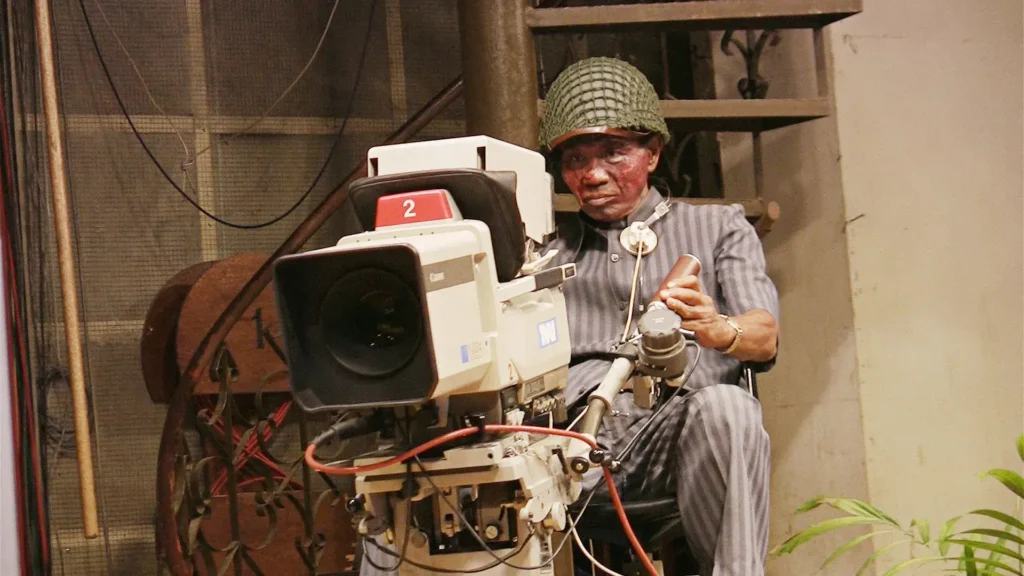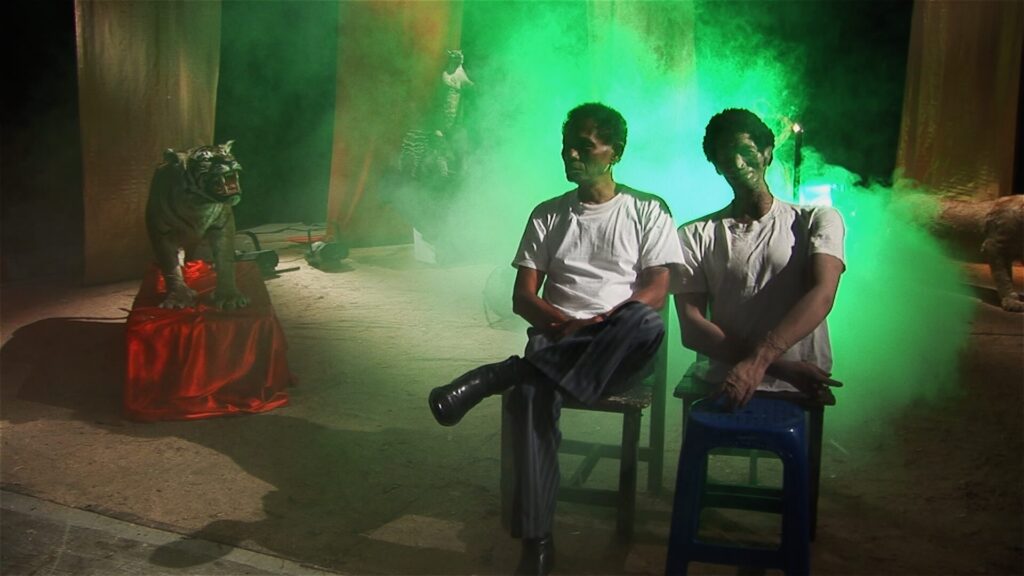Joshua Oppenheimer’s The Act of Killing is a challenging documentary. It is not only difficult to watch, but it also probes into one of the most grotesque aspects of human nature: the capacity for self-delusion in the face of horrific atrocities. This isn’t a film about history, facts, or statistics; it’s about the memories of the men who killed, the stories they tell themselves, and how they continue to live with the horrors they’ve inflicted on others. The film’s power lies in its ability to take the viewer beyond a surface-level understanding of evil and into the psychological abyss of those who have committed atrocities—and seemingly moved on with their lives.

The Act of Killing is brutal, deeply uncomfortable, and offers no escape from the psychological maze in which its subjects are trapped. Oppenheimer gives the interviewees—former death squad leaders in Indonesia—an extraordinary amount of control in telling their stories, even allowing them to reenact their killings in a style of their choosing. And here is where the brilliance of the film lies: in letting the perpetrators themselves direct their own narrative, we see not only how they remember their crimes, but how they have mythologized and justified them.
The film’s setting is post-1965 Indonesia, after a military coup led to the mass killing of an estimated one million people, mainly suspected communists, ethnic Chinese, and intellectuals. These killings were carried out by paramilitary death squads, many of whose members now live comfortably and are treated as local heroes. The film focuses primarily on one such man, Anwar Congo, who personally killed hundreds and led a squad responsible for thousands of deaths. Through Oppenheimer’s lens, we watch as Congo and his associates gleefully recount their killings, demonstrating techniques with chilling ease, as though they were recalling a scene from an action film rather than real life.

What’s striking about the film is its lack of formal interrogation. Oppenheimer doesn’t press these men, nor does he insert his own judgment into their narratives. Instead, he gives them the room to express their stories in their own words, and this space reveals something more profound than an interview-based exposé ever could. Congo and his cohorts boast of their crimes in the same way someone might boast about their successes at work. They do not appear to feel guilt or remorse—at least, not initially. But as the film progresses, something remarkable happens. In recounting their deeds, the weight of their actions begins to dawn on them, and the audience witnesses in real-time the slow cracking of their carefully constructed façades.
The central conceit of The Act of Killing—allowing the killers to reenact their own acts of violence as if they were making a movie—is perhaps its most audacious and disturbing choice. Congo, a fan of Hollywood gangster films and musicals, chooses to stage his killings in a variety of flamboyant styles: from noirish crime scenes to full-blown musicals. The absurdity of watching men reenact mass murder with theatrical glee is difficult to process, but therein lies the film’s disturbing brilliance. It forces us to confront the way violence has been romanticized in popular culture, and it reveals how these men, steeped in that same culture, have shaped their memories of killing to align with cinematic tropes. The surreal quality of these reenactments almost shields the killers from the reality of their actions—until, slowly, it doesn’t.

This is where The Act of Killing excels: it allows the audience to witness a slow, agonizing unraveling. At the outset, Congo is proud of his actions. He walks with confidence, reveling in his past as if it were a heroic tale. But as the reenactments proceed, something shifts. There’s a moment in the film where Congo himself plays the role of a victim, allowing himself to experience—however briefly—a glimpse of the terror his victims must have felt. After filming this scene, he becomes visibly shaken. His body language changes; his voice softens. In one of the film’s most harrowing sequences, he returns to the site where many of the murders were committed and, after demonstrating his garrote technique for the camera, he physically recoils, dry-heaving as if the truth has finally hit him. For the first time, we see the cost of self-delusion, as his constructed reality of heroic violence begins to crumble under the weight of memory and truth.
One of the film’s key strengths is how it illuminates the mental disconnect that people create to justify atrocities. Congo and his associates speak of their victims as though they were subhuman, merely “communists” or “enemies,” terms which allow them to distance themselves from the reality of their acts. The casual way they recount their deeds, at first, is almost more horrifying than the deeds themselves. There is no remorse, no reflection—just a cold, matter-of-fact description of mass murder. But as the film unfolds, it becomes clear that this emotional distance is a façade, a psychological defense mechanism that is beginning to wear thin. As they reenact their actions, as they speak about their killings again and again, the horror of what they did begins to seep into their consciousness.

Stylistically, The Act of Killing isn’t flashy. Oppenheimer’s filmmaking isn’t the star here, nor is it meant to be. He wisely steps back, letting the interviewees direct the film, both metaphorically and literally. This is not a film that relies on stylized editing or powerful music cues to guide our emotions. Instead, it trusts in the raw power of its subjects’ words and actions to carry the emotional weight. The pacing is deliberate, sometimes even slow, as if giving the subjects—and the audience—time to fully absorb what is being said. There’s a quiet intensity to this approach, a slow build of tension that pays off in small, devastating moments rather than grand confrontations.
The killers in this film are not monsters in the traditional sense. They are people who have convinced themselves that what they did was necessary, even noble. Watching them come to terms—albeit slowly and incompletely—with the enormity of their crimes is both painful and illuminating.
Oppenheimer’s film does not provide easy answers, nor does it offer catharsis. But that’s the point. It leaves us with difficult questions about the nature of evil, memory, and the human capacity to justify the unjustifiable. For its willingness to explore such dark terrain with unflinching honesty, The Act of Killing deserves a place among some of the most important documentaries ever made.
Score: 9/10

Leave a Reply